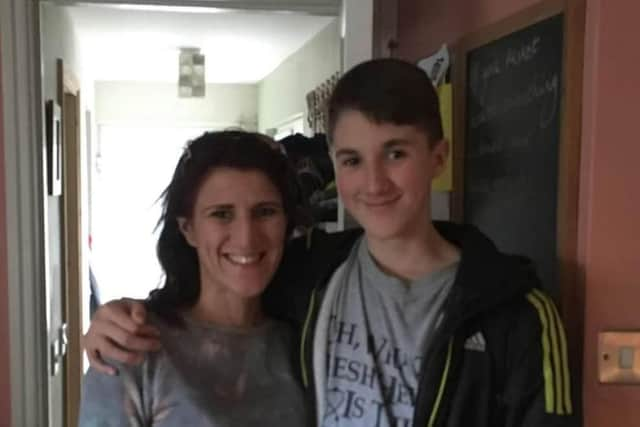Yorkshire mum asked for teenage son to be sectioned the day before he was found dead
and live on Freeview channel 276
Ben Nelson-Roux was found by his mother Kate Roux, at Cavendish House hostel, on April 8 in 2020, after taking a number of drugs.
She said her son had been struggling with attention deficit hyperactivity disorder (ADHD), severe mental health issues and drug and alcohol abuse for years. He had also been exploited by drug dealers after falling into debt.
Advertisement
Hide AdAdvertisement
Hide AdThe schoolboy was provided with accomodation at the Harrogate Borough Council-run hostel after his mother had asked him to leave the family home in January 2020, because he had become aggressive and violent.


An inquest heard he had been receiving support and advice from mental health professionals, social workers and the drug and alcohol treatment charity Compass Reach.
He was admitted to Harrogate District Hospital on April 6 – two days before his death – because he took diazepam and crack cocaine and expressed suicidal thoughts.
The following day, Ms Roux contacted Dr David Loveday-Sims, a psychiatrist with the Child and Adolescent Mental Health Service (CAMHS), and asked if her son could be detained under the Mental Health Act, for his own safety.
Advertisement
Hide AdAdvertisement
Hide AdDr Loveday-Sims said she “expressed her fear that Ben might die in the following two weeks”, but mental health crisis teams and doctors at the hospital agreed there were “no current grounds” to detain him.
He said it was Mr Nelson-Roux’s “increased use of drugs and alcohol” that was “increasing the risk of harm to himself and others”, but the teenager refused to stop.
He also said the boy’s accommodation “posed a significant risk” and his mother was asked to consider bringing him home as “a short-term safeguard”.
The inquest in Northallerton heard Dr Loveday-Sims first met Mr Roux and his mother in December 2019, to discuss the issues he was dealing with, and concluded that he should be provided with advice and support but did not require “intensive therapy”.
Advertisement
Hide AdAdvertisement
Hide AdAccording to the psychiatrist, Ben struggled with exreme mood swings, violent outburst and paranoia. He also claimed to occasionally hear voices and attempted to self medicate with cannabis, ecstasy and other illegal drugs.
He said Ben was initially reluctant to engage with CAMHS and he was urged to prioritise treatment for his drug and alcohol issues, as they were seen as “a major barrier to improvement”.
The psychiatrist also said Ben was “a thoughtful and chatty young man who was often polite” when he was sober.
In January, the CAMHS team were told that Mr Nelson-Roux had attempted to take his life several times over the Christmas period.
Advertisement
Hide AdAdvertisement
Hide AdBut according to Dr Loveday-Sims, they concluded that these incidents were “better seen as risk taking exercises” and he was looking to “gain power or cash”.
The CAMHS team reviewed his case and raised serious concerns about his drug abuse, but concluded that they “weren't dealing with a serious mental illness” and he was “not a danger to the public”.
Dr Loveday-Sims had several more meetings with Mr Nelson-Roux, and during one in February the teenager said he planned to find secure accommodation, get fit, cut down on smoking cannabis and find a part-time job.
But after he missed two consecutive appointments in March, CAMHS decided to close his case.
Advertisement
Hide AdAdvertisement
Hide AdDr Loveday-Sims he was disappointed the boy had “consistently not consented to treatment and realistically was unable to engage with treatment given his other unmet needs”.
“I recall being disappointed that Ben had stopped seeing me, as there were promising moments of connection, engagement and meaningful banter,” he added.
The inquest continues.